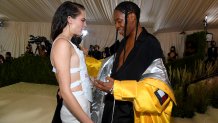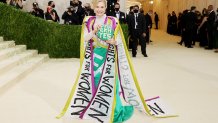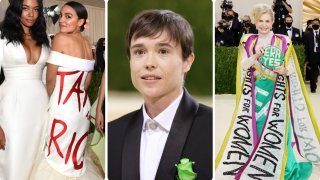The Met Gala - or for those unaware, the annual shindig at the Metropolitan Museum of Art in New York City - is a who's who of the rich and famous and artistic and powerful, all dressed up and walking a red carpet.
This year, several guests used their outfits to express points of view or advocate for legislation - some more loudly and obviously than others.

Cara Delevingne opted to wear a jumpsuit bearing a message we can't really print in a family-friendly news site. We can report that Delevingne's Met Gala outfit spoke out against the patriarchy, a system in which men hold power over society. The rest is up to you.
Here are just a few of the other guests who used the lavish occasion to promote a cause:
Rep. Alexandria Ocasio-Cortez's "Tax the Rich" dress

U.S. Rep. Alexandria Ocasio-Cortez (D-NY) wore a white dress emblazoned with "Tax the Rich" in all-capital letters (to an event swarming with rich people, no less).
AOC is part of the progressive wing of the Democratic Party and has frequently called for higher taxation to pay for social programs like childcare and health care.
She appeared at the gala with designer Aurora James, who got started at a flea market in Brooklyn before "kick[ing] open the doors at the Met," Ocasio-Cortez wrote on social media.
Elliot Page's Green Carnation

Elliot Page attended the Met Gala in New York Monday night dressed to the nines in a black Balenciaga suit with an interesting lapel accessory that pretty quickly got people talking.
Page was wearing a green carnation on his lapel, leading many to speculate it was a reference to Oscar Wilde. The British author and playwright once asked friends to wear green carnations on their lapels, and it became a symbol to identify yourself as a gay man, according to JSTOR.
In a time where being an out gay man was outlawed, Wilde would never say exactly what the flowers were supposed to represent, according to Oscar Wilde Tours. But the flower was considered a gay symbol by the time Wilde was put on trial for "gross indecency" - having an affair with the Lord Alfred Douglas.
This is a major public appearance for Page since coming out as a trans man in December 2020. Page made a public statement on Twitter thanking loved ones for supporting him and calling out discrimination against other transgender people.
More From NBCLX
What You Need to Know About Applying For a Job as an LGBTQ Applicant
Religion Shouldn't Conflict With Being LGBTQ, Faith Leaders Say
Rep. Carolyn Maloney called for equal rights for women

Ocasio-Cortez wasn't the only New York congressperson to send a message with their outfit.
Rep. Carolyn Maloney appeared in a multicolored dress with multiple trailing pieces of fabric - each declaring "equal rights for women." Maloney held a green button that said "ERA Yes," referring to the Equal Rights Amendment.
The amendment guarantees equal rights for women but cannot be added to the Constitution until it is ratified by at least 38 states. When the amendment initially went up for ratification in the 1970s, it did not reach that goal by the 7-year deadline.
Over the past few decades, Congress has repeatedly extended the deadline for enough states to ratify the amendment. The latest bill to extend the deadline has passed the House but is still in the Senate.


